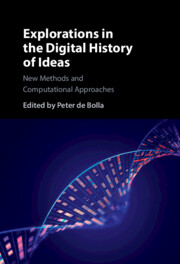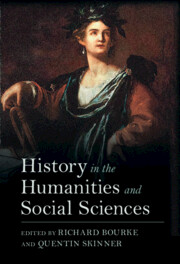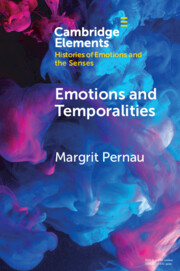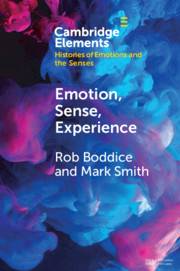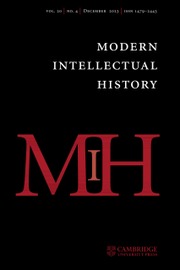Explorations in the Digital History of Ideas
New Methods and Computational Approaches
£85.00
- Editor: Peter de Bolla, University of Cambridge
- Date Published: November 2023
- availability: Available
- format: Hardback
- isbn: 9781009263580
£
85.00
Hardback
Other available formats:
eBook
Looking for an inspection copy?
This title is not currently available on inspection
-
What would the history of ideas look like if we were able to read the entire archive of printed material of a historical period? Would our 'great men (usually)' story of how ideas are formed and change over time begin to look very different? This book explores these questions through case studies on ideas such as 'liberty', 'republicanism' or 'government' using digital humanities approaches to large scale text data sets. It sets out the methodologies and tools created by the Cambridge Concept Lab as exemplifications of how new digital methods can open up the history of ideas to heretofore unseen avenues of enquiry and evidence. By applying text mining techniques to intellectual history or the history of concepts, this book explains how computational approaches to text mining can substantially increase the power of our understanding of ideas in history.
Read more- Provides intellectual historians with some new methods and exemplary approaches
- Engages with quantitative and computational methods for text mining
- Offers exemplary methods and techniques for a digital history of ideas which will enable scholars working on any period to engage with new computational approaches to the history of ideas
Customer reviews
Not yet reviewed
Be the first to review
Review was not posted due to profanity
×Product details
- Date Published: November 2023
- format: Hardback
- isbn: 9781009263580
- length: 300 pages
- dimensions: 235 x 156 x 20 mm
- weight: 0.64kg
- availability: Available
Table of Contents
Part I. Computational Methodologies for the History of Ideas:
1. Introduction Peter de Bolla
2. Distributional Concept Analysis and the Digital History of Ideas Peter de Bolla, Ewan Jones, Paul Nulty, Gabriel Recchia and John Regan
3. Operationalizing Conceptual Structure Paul Nulty
Part II. Case Studies in the Digital History of Ideas:
4. The Idea of Liberty, 1600-1800 Peter de Bolla, Ewan Jones, Paul Nulty, Gabriel Recchia and John Regan
5. The Idea of Government in the British Eighteenth Century Peter de Bolla, Ewan Jones, Paul Nulty, Gabriel Recchia and John Regan
6. Republicanism in the Founding of America Peter de Bolla
7. Enlightenment Entanglements of Improvement and Growth Peter de Bolla, Ryan Heuser and Mark Algee-Hewitt
8. The Idea of Commercial Society: Changing Contexts and Scales John Regan
9. The Age of Irritability Ewan Jones and Natalie Roxburgh
10. On Bubbles and Bubbling: The Idea of 'The South Sea Bubble' Claire Wilkinson
11. Embedded Ideas: Revolutionary Theory and Political Science in the Eighteenth Century Mark Algee-Hewitt
12. Computing Koselleck: Modeling Semantic Revolutions, 1720-1960 Ryan Heuser.-
General Resources
Find resources associated with this title
Type Name Unlocked * Format Size Showing of
This title is supported by one or more locked resources. Access to locked resources is granted exclusively by Cambridge University Press to lecturers whose faculty status has been verified. To gain access to locked resources, lecturers should sign in to or register for a Cambridge user account.
Please use locked resources responsibly and exercise your professional discretion when choosing how you share these materials with your students. Other lecturers may wish to use locked resources for assessment purposes and their usefulness is undermined when the source files (for example, solution manuals or test banks) are shared online or via social networks.
Supplementary resources are subject to copyright. Lecturers are permitted to view, print or download these resources for use in their teaching, but may not change them or use them for commercial gain.
If you are having problems accessing these resources please contact [email protected].
Sorry, this resource is locked
Please register or sign in to request access. If you are having problems accessing these resources please email [email protected]
Register Sign in» Proceed
You are now leaving the Cambridge University Press website. Your eBook purchase and download will be completed by our partner www.ebooks.com. Please see the permission section of the www.ebooks.com catalogue page for details of the print & copy limits on our eBooks.
Continue ×Are you sure you want to delete your account?
This cannot be undone.
Thank you for your feedback which will help us improve our service.
If you requested a response, we will make sure to get back to you shortly.
×
